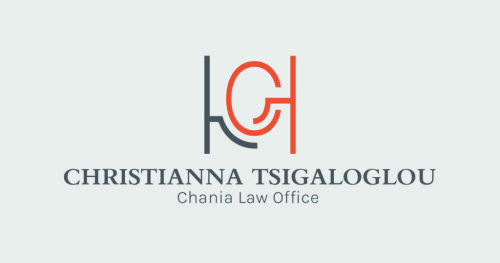Best Commercial Real Estate Lawyers in Chania
Share your needs with us, get contacted by law firms.
Free. Takes 2 min.
Free Guide to Hiring a Real Estate Lawyer
List of the best lawyers in Chania, Greece
About Commercial Real Estate Law in Chania, Greece
Chania, nestled on the northwest coast of Crete, is a city with a vibrant real estate market that attracts both local and international investors. Commercial real estate in Chania includes offices, retail spaces, hotels, warehouses, and industrial sites. The increasing demand for commercial property, combined with Greece’s unique legal landscape, makes navigating transactions and property management a complex process. Greek property law involves a multitude of regulations on ownership, leasing, zoning, and tax, all of which can impact commercial real estate activities in Chania.
Why You May Need a Lawyer
Venturing into commercial real estate in Chania almost always requires professional legal guidance. Common situations where legal assistance is crucial include:
- Purchasing or selling commercial property, especially as a foreign investor
- Negotiating or drafting commercial leases and tenancy agreements
- Conducting property due diligence, including title checks and encumbrance investigations
- Handling zoning or planning permission for property development or conversion
- Dealing with property disputes, such as eviction, boundary disagreements, or inheritance claims
- Complying with tax obligations and understanding related incentives
- Navigating business licensing and regulatory compliance
- Assisting with financing arrangements and mortgage documentation
- Advising on corporate structuring for property ownership and investment
Local Laws Overview
Several key aspects of Greek law have a direct impact on commercial real estate transactions in Chania:
- Ownership Regulations: Greek property law allows both individuals and legal entities to own commercial real estate, including foreigners, subject to certain restrictions in border regions or areas of national security.
- Land Registry: All property transactions must be registered with the local Land Registry (Ktimatologio). Proper searches are vital to confirm legal title and ensure that the property is free from claims or liens.
- Zoning and Urban Planning: The Hellenic Planning and Environment framework sets rules on land use, zoning, and permitted activities. Approval from relevant municipal authorities is often required for construction, renovation, or change of use for commercial purposes.
- Leasing Laws: Commercial leases are generally governed by contractual agreement, though certain legal protections apply. Duration, rent escalation, renewal terms, and subleasing should be clearly outlined in the agreement.
- Taxation: Buyers must pay Transfer Tax, and ongoing property ownership is subject to the ENFIA property tax. VAT may apply to new commercial developments or rentals.
- Environmental Regulations: Environmental assessments or permits may be needed, particularly for properties to be used for industrial or tourism purposes.
Frequently Asked Questions
What types of commercial properties are most common in Chania?
Chania’s commercial real estate market includes retail shops, restaurants, hotels, warehouses, offices, and tourist accommodations. The hospitality sector is especially prominent due to Chania’s popularity as a tourist destination.
Can foreigners buy commercial property in Chania?
Yes, foreigners can generally purchase commercial property in Chania. However, certain restrictions and additional procedures may apply for non-EU residents or for properties in border or protected zones.
What taxes and fees are involved in purchasing commercial real estate?
The main taxes include the Property Transfer Tax, VAT (if applicable), notary fees, registration fees, and lawyer's fees. Annual property taxes such as ENFIA also apply post-acquisition.
What is involved in due diligence for a commercial real estate transaction?
Due diligence includes verifying property title, checking for encumbrances or liens, confirming appropriate zoning and usage permissions, and ensuring there are no outstanding legal or tax obligations attached to the property.
How are commercial leases structured under Greek law?
Commercial leases are typically negotiated between parties and should be in written form. Important terms include duration, rent, usage, subleasing permissions, and termination clauses.
Is a notary required for buying or selling commercial property?
Yes, by Greek law, all property transfers must be officially executed and recorded by a public notary. The notary ensures the transaction’s legality and submits documents to the Land Registry.
What happens if a dispute arises over commercial property?
Disputes may be resolved through negotiation, mediation, or court proceedings. Common disputes involve ownership, boundary lines, rent arrears, and breach of contract. Legal representation is highly advisable.
What permits are needed for renovating a commercial property?
Most renovation or change-of-use works require approval from the local urban planning office. Specific permits depend on the scale and nature of the intended works.
Does Greek law protect tenants in commercial properties?
While commercial leases are largely governed by contract, certain minimum rights exist under Greek law, such as notice requirements for termination and procedures for handling overdue rent or lease breaches.
How long does it take to complete a commercial real estate transaction in Chania?
A straightforward sale can be completed in one to three months, provided all documentation is in order and no legal issues arise. More complex transactions or properties with encumbrances may take longer.
Additional Resources
The following resources can be highly useful for individuals and companies involved with commercial real estate in Chania:
- Chania Bar Association (providing lists of licensed lawyers experienced in real estate law)
- Greek Land Registry (Ktimatologio) office in Chania
- Chania Chamber of Commerce and Industry (offering guidance on business property, permits, and investment incentives)
- Municipality of Chania Urban Planning Authority (responsible for zoning, permits, and compliance)
- Hellenic Cadastre for official property registration and title checks
- Local real estate agencies with commercial experience
Next Steps
If you are considering purchasing, leasing, or investing in commercial property in Chania, Greece, take these steps:
- Clearly define your real estate goals and requirements.
- Engage a qualified local lawyer experienced in commercial real estate to advise you throughout the process.
- Carry out comprehensive due diligence on your targeted property with legal and technical experts.
- Consult relevant government offices for required permits, registrations, and certificates.
- Review all contractual documents with your lawyer and seek clarification on any terms you do not fully understand.
- Ensure timely completion of all tax, registration, and notarial steps before transfer of ownership or lease commencement.
- If issues or disputes arise, seek immediate legal counsel to protect your interests and explore resolution pathways.
By being well-informed and seeking local legal expertise, you can confidently navigate Chania’s commercial real estate market, safeguarding your investment and ensuring compliance with all legal requirements.
Lawzana helps you find the best lawyers and law firms in Chania through a curated and pre-screened list of qualified legal professionals. Our platform offers rankings and detailed profiles of attorneys and law firms, allowing you to compare based on practice areas, including Commercial Real Estate, experience, and client feedback.
Each profile includes a description of the firm's areas of practice, client reviews, team members and partners, year of establishment, spoken languages, office locations, contact information, social media presence, and any published articles or resources. Most firms on our platform speak English and are experienced in both local and international legal matters.
Get a quote from top-rated law firms in Chania, Greece — quickly, securely, and without unnecessary hassle.
Disclaimer:
The information provided on this page is for general informational purposes only and does not constitute legal advice. While we strive to ensure the accuracy and relevance of the content, legal information may change over time, and interpretations of the law can vary. You should always consult with a qualified legal professional for advice specific to your situation.
We disclaim all liability for actions taken or not taken based on the content of this page. If you believe any information is incorrect or outdated, please contact us, and we will review and update it where appropriate.











